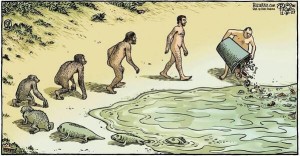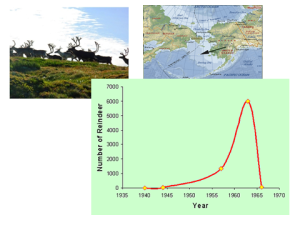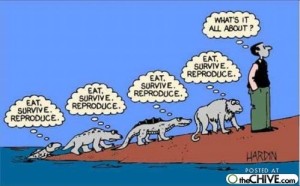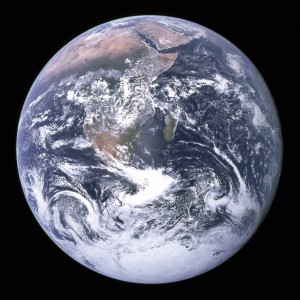About Erlend
View all posts by Erlend
Save biodiversity for humanity.
(For the sake of argument)
By Erlend Bersaas.
Increasing temperatures, changes in precipitation patterns, loss of ice, rising sea levels, loss of biodiversity, “the sixth extinction”, freshwater shortage, ocean acidification. All apparently due to one single species astonishing evolutionary success. Homo sapiens sapiens. Humans.
The impact our species have had is so vast that we are in the process of defining our own epoch. The Anthropocene (Vaughan, 2016). The ongoing debate on when the Anthropocene started is not that interesting. The point is that it already has started, and we need to slow down the destruction of our habitat. If not, we are dangerously close to reaching our species carrying capacity. Just feeding an ever-increasing population will eventually become difficult should there not come a second “green revolution” (Godfray et al. 2010). We do not want to end up like the reindeers of St. Matthews Island, an island in the Bering Sea, where 29 animals were introduced in 1944, increased to over 6000, with the result of total collapse by 1966 (Klein 1968).
Hardly any place on the planet is unaffected by humans (Millennium Ecosystem Assessment 2005). Some honourable mentions could be the lakes, which we have not yet disturbed; beneath the cryosphere, but the rest of the planet have experienced some form of human fingerprint. Most of the implications of our behaviour is negative for other species although there are of course exceptions, such as rats and maize, or sheep for that matter, but in general, I do not think too many will disagree with the idea of humans as a negative force on the wildlife and ecosystems. As the Millennium Ecosystem Assessment (2005) states:
Human actions are fundamentally, and to a significant extent irreversibly, changing the diversity of life on Earth, and most of these changes represent a loss of biodiversity. Changes in important components of biological diversity were more rapid in the past 50 years than at any time in human history. Projections and scenarios indicate that these rates will continue, or accelerate, in the future. (Millennium Ecosystem Assessment, 2005, p. 2)
However, why is this a bad thing? Sure, we have transformed a lot of the planet, but in doing so we have become greatly successful. And basically that is what it`s all about.
We are after all competing with every other organism on this planet. The problems arise when we have exhausted our recourses and begin to suffer for it. Thinking that nature is some pristine place, an Eden, where animals and plants live in some sort of stabile harmony, is not going to get us anywhere. We are here, and we are a part of nature as is every other organism. We just dominate everything. We have even made up stories to alleviate us from any moral dilemma concerning other species. The only implications we have had to consider was the one that affected us directly. Just think of what The Bible is saying on the matter of human supremacy on nature:
And God blessed Noah and his sons and said to them, «Be fruitful and multiply, and fill the earth. The fear of you and the terror of you will be on every beast of the earth and on every bird of the sky; with everything that creeps on the ground, and all the fish of the sea, into your hand they are given. Every moving thing that is alive shall be food for you; I give all to you, as I gave the green plant.”
Genesis 9. 1-3 (God, no date.)
The meme of humans as something outside of nature seems to have been greatly successful and have probably participated in our species great evolutionary success. However, because we no longer had to take considerations to what we did with nature, more or less every other organism suffered*.We can argue that this is morally wrong, and that everything has an intrinsic value. It does however look like self-preservation is the underlying argument when trying to convince anyone to save biodiversity and ecosystems.
The UN gives us the argument that we have to save biodiversity because “Biodiversity produces six major services for us: It gives us clean water, food, building materials and medicines. It protects us against extreme weather and help prevent climate change” (Globalis 2016 (my translation)). We can also add different pleasures as recreation, beauty and knowing that some organisms exist, but we should be honest about it. We want to protect life in all its forms due to its value for us. If we do not think anthropocentrically we know what we have to do to stop our domination and destruction of other species, but I for one will not participate in culling half the world’s population.
The Earth is the only world known so far to harbor life. There is nowhere else, at least in the near future, to which our species could migrate. Visit, yes. Settle, not yet. Like it or not, for the moment the Earth is where we make our stand. (Sagan 1994)
*Without going into whether every organism can suffer, because that will only lead to some sort of philosophical argument of where different organisms should be placed on a gradient for the separation of humans from the rest.
Figures:
1: Piraro, D (2007) [Internet] available at: http://bizarro.com/page/2/?s=evolution&submit=Search . Accessed [26.02.2016]
2: Klein, D., Walsh, J. and Shulski, M. (2009) What Killed the Reindeer of Saint Matthew Island? [Internet] available at: http://www.weatherwise.org/Archives/Back Issues/2009/Nov-Dec 2009/full-Reindeer.html. Graph from: [ Internet]http://qualicuminstitute.ca/tenets/317-2/ . Accessed [25.02.2016]
3: Hardin (No Date) [Internet] available at: http://thechive.com/2009/02/26/every-single-evolution-cartoon-we-could-get-our-hands-on-36-photos/ . Accessed [26.02.2016]
4: NASA (2015) Blue Marble – Image of the Earth from Apollo 17. [Internet] http://www.nasa.gov/content/blue-marble-image-of-the-earth-from-apollo-17 . Accessed [26.02.2016]
Sources:
Globalis (2016) Hvorfor er naturmangfold viktig? [Internet] http://www.globalis.no/Tema/Naturmangfold/2.-Hvorfor-er-naturmangfold-viktig .Accessed [25.02.2016]
God (No Date) The Bible. Nicaea.
Godfray H.C.J., J. R. Beddington, I.R. Crute, L. Haddad, D. Lawrence, J.F. Muir, J. Pretty, S.
Robinson, S. M. Thomas, C. Toulmin (2010) “Food: Security: The Challenge of
Feeding 9 Billion People”. Science. 327: 812-818
Klein, D. R. (1968) The introduction, increase, and crash of reindeer on St. Matthew Island.
- Wildl. Manage. 32: 351-367.
Millennium Ecosystem Assessment, 2005. Ecosystems and Human Well-being: Biodiversity Synthesis. World Resources Institute, Washington, DC.
Sagan, C. (1994) Pale blue dot. Also available on YouTube at https://www.youtube.com/watch?v=4PN5JJDh78I
Vaughan, A (2016) Human impact has pushed Earth into the Anthropocene, scientists say. The Guardian. [Internet] http://www.theguardian.com/environment/2016/jan/07/human-impact-has-pushed-earth-into-the-anthropocene-scientists-say . Accessed [25.02.2016]



